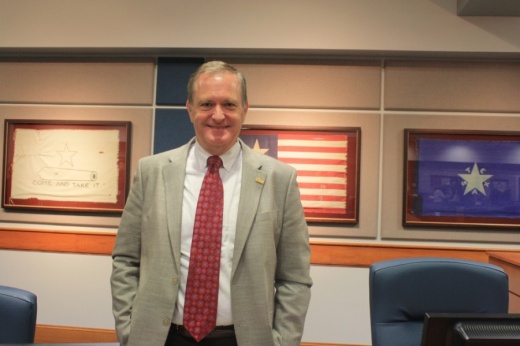Unlike many other Texas school districts whose 2019-20 fiscal year ends June 30, KISD’s last day of the 2019-20 fiscal year is Aug. 31, Smith said. A public hearing about the new budget and tax rate will be held in August before the board votes on it, per his presentation.
Here are three things to know from the May 26 update.
1. Property tax rate decrease
Because of House Bill 3—a school finance reform law passed during the 86th state legislative session—property owners within Katy ISD's jurisdiction will see a lower property tax rate for the next tax year, Smith said.“I know we'll be able to decrease it by at least a penny and a half, and I’m seeing [that it’s] going to be more than $0.02 that we’re going to be dropping our tax rate,” he said.
The amount the tax rate will decrease is dependent on property value growth: the higher the value growth, the higher the tax decrease, Smith said.
“Districts across the state will be dropping their rates at different amounts,” he said.
KISD’s taxable value is estimated to grow about 5.44% to $44.1 billion for fiscal year 2020-21, per Smith’s budget presentation to the board. Because this value growth is more than 4.5%, KISD will have to lower its tax rate by more than a penny and a half, he added.
KISD will set its new tax rate in August. The district’s total FY 2019-20 adopted tax rate is $1.4431 per $100 in valuation.
2. Staff salary increase
Smith also said that the 2020-21 budget includes a 1% salary increase as well as a 1% lump sum payment that is usually given to staff in December.Per a slide in Smith’s presentation, the salary increase and lump sum payment are for teachers and nonteachers.
Smith recognized this is a much smaller salary increase compared to the one given for the 2019-20 school year in which some staff members could earn up to as much as an 8% compensation increase.
“Remember, last year, under the on the coattails of passing House Bill 3, we gave the biggest salary increases that we were able to that we had done in years,” he said. “House Bill 3 provided us that opportunity, and we went all out in doing so.”
A performance incentive is also included in the 2020-21 budget, Smith added.
3. COVID-19 effect on the budget
At a May 18 Katy Area Chamber of Commerce webinar, Superintendent Ken Gregorski spoke briefly about the district’s budget and how it could be affected by the coronavirus pandemic.“I'm not so concerned about our current budget,” he said. “Only time will tell to see how much that impacts any future budgets moving into next year beyond next year.”
However, at the May 26 meeting, Smith said there are still too many uncertainties to predict how COVID-19 will affect the district’s future budgets. In particular, school funding relies on enrollment and students’ average daily attendance, he said.
“We have a pretty good average of around 97%, so kids do get sick and don’t come to school,” he said. “But what will the ongoing effects [of COVID-19] do to our trends ... and how will that change over this next year?
KISD has asked its demographer, Population and Survey Analysts, to provide an update about future enrollment trends, he said.
Additionally, with a slow economy, state funding for school districts could be less than expected, though federal stimulus funds could help, Smith said. He added KISD finance team has been reviewing previous KISD budgets during recessions and funding reductions to prepare.
However, Smith noted KISD’s finances are in a good spot. Since FY 2011-12, KISD’s fund balance has had at least three months of savings. The district also received some “significant Hurricane Harvey dollars” from another state bill and $10 million from an insurance settlement related to Harvey, he added.
“Those two anomalies pushed us up and revenues one-time stuff but put us in a more comfortable position for maybe a rainy day,” Smith said.





